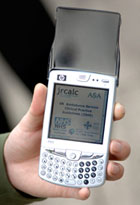 Academics at the University of Warwick have developed a new hand held computer link to emergency medical data designed to help ambulance crews get quick access to information sources on common confusions faced by paramedics.
Academics at the University of Warwick have developed a new hand held computer link to emergency medical data designed to help ambulance crews get quick access to information sources on common confusions faced by paramedics.
Working closely with the Joint Royal Colleges Ambulance Liaison Committee (JRCALC), the academics have developed software that will provide emergency workers with information from a number of medical sources.
These include the National Poisons Information Service www.toxbase.org and the British National Formulary online database www.bnf.org, which will help ambulance workers better understand a patient’s condition and medical history.
Dr Joanne Fisher, principal researcher for the device, told E-Health Insider: “The software can be run on any hand-held device or pocket application, and is invaluable to anyone working in pre-hospital care. We have taken a host of information, traditionally kept as paper-based or on hard to reach websites and combined them all into electronic format.
“The software is menu driven, and you can use it like you would Internet Explorer, searching for data, benchmarking favourite pages and looking up drugs that the patient is on to check recommended dosages. Side effects or even how to resuscitate someone who may need things done in a specific way. With just a few clicks, the emergency worker can now access this free of charge.”
The tool has been named the Ambulance Crew Electronic Pocket Guide for Personal Digital Assistants, and has been worked on for six years with JRCALC. It has been piloted and tested thoroughly and a beta version was launched at last month’s Ambulance Service Association Conference (AMBEX) in Harrogate.
Dr Fisher added: “We feel ready to launch the product now and have been showcasing a live version of the tool at AMBEX. The reactions we have been receiving have been very positive, and we are now launching a beta version for one month so that professionals can tell us what else they would like from it. Essentially, the product is like a calculator for accountants – a useful aid for day-to-day routines.”
There is also the potential to use the PDA display to give information or ask patients key standard medical questions in their own language and indicate answers to those questions.
Tom Clarke, chairman of JRCALC and medical advisor to North East Ambulance Service, said: “This new electronic format for the pocket book is to be universally welcomed. Conveniently providing even faster and easier access to vital clinical information which will undoubtedly enhance patient care in the challenging prehospital environment.”
The University of Warwick research team on the project are Professor Matthew Cooke and Dr Joanne Fisher from Warwick Medical School , and Dr Evor Hines and Dr Daciana Iliescu from the University of Warwick’s Engineering Department’s computer software engineering team.
The team from the Joint Royal Colleges Ambulance Liaison Committee are Dr Simon Brown, chairman of the Clinical Practice Guidelines Committee and Dr Thomas Clarke, Chairman of JRCALC.
Further information is available on the JRCALC’s clinical practice guideline stakeholder website.
